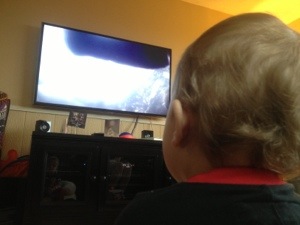Wow. The more I read of his stuff, the more upset I become that David Foster Wallace is no longer around to think about things and then tell us his thoughts.
TV-watching as a malignant cycle doesn’t even require special preconditions like writerly self-consciousness or loneliness. Let’s for a second imagine Joe Briefcase as now just average, relatively unlonely, adjusted, married, blessed with 2.5 apple-cheeked issue, normal, home from hard work at 5:30, starting his average six-hour stint. Since Joe B. is average, he’ll shrug at pollsters’ questions and say he most often watches television to “unwind” from those elements of his day and life he finds stressful. It’s tempting to suppose that TV enables this “unwinding” simply because it offers an Auschlanderian distraction, something to divert the mind from quotidian troubles. But would mere distraction ensure continual massive watching? Television offers more than distraction. In lots of ways, television purveys and enables dreams, and most of these dreams involve some sort of transcendence of average daily life. The modes of presentation that work best for TV – stuff like “action,” with shoot-outs and car wrecks, or the rapid-fire “collage” of commercials, news, and music videos, or the “hysteria” of prime-time soap and sitcom with broad gestures, high voices, too much laughter – are unsubtle in their whispers that, somewhere, life is quicker, denser, more interesting, more … well, lively than contemporary life as Joe Briefcase knows and moves through it. This might seem benign until we consider that what average Joe Briefcase does more than almost anything else in contemporary life is watch television, an activity which anyone with an average brain can see does not make for a very dense and lively life. Since television must seek to compel attention by offering a dreamy promise of escape from daily life, and since stats confirm that so grossly much of ordinary U.S. life is watching TV, TV’s whispered promises must somehow undercut television-watching in theory (“Joe, Joe, there’s a world where life is lively, where nobody spends six hours a day unwinding before a piece of furniture”) while reinforcing television-watching in practice (“Joe, Joe, your best and only access to this world is TV”).
From “E unibus pluram“, an amazing essay on what it means to watch TV. It is difficult to put in perspective the clarity of insight in this piece and the importance of its conclusions, but it blows my mind to think that Wallace was writing in 1992 – before the curiously ironic, but undoubtedly atomizing and isolating effects of widespread Internet use had become apparent to just about everybody.

